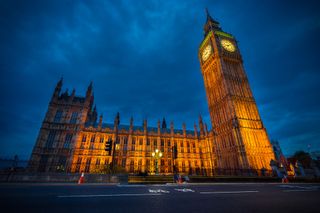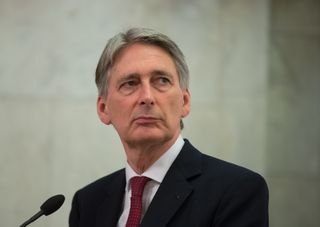How policymakers are plotting to reign in the tech sector
From breaking up monopolies to GDPR-style fines, major players in public policy are having their say on regulating big tech

Cambridge Analytica; encryption; data protection; extremist content; online abuse; these are the battlegrounds on which the UK government has found itself engaged with tech giants over the years. But the temperature has intensified in the last few months and fresh regulations are imminent.
All groups with an interest, from the Labour Party to parliamentary committees, have agreed that self-regulation has failed. The model by which companies are expected to make changes on their own accord, rather than under the threat of law, has not led to any satisfactory changes as far as these groups are concerned. For one, tech firms of this scale see themselves as being above regulators, so powers of persuasion are limited.
The government's own long-awaited 'Online Harms' white paper, putting forward its ideas for tech regulation, is still something of an enigma, however. Few details as to the core thinking behind the joint Home Office and Department for Digital, Culture, Media and Sport (DCMS) venture have come to light, beyond vague calls that 'something should be done'.
This level of reluctance cannot be said for a host of non-governmental bodies and the government's opponents, which, on some level, have enjoyed the luxury of not having to make decisions. They have, by contrast, been vocal in exactly what they would do with the likes of Facebook and Google.
The DCMS select committee
What began life as a glimpse into how fake news spreads online, the DCMS probe has now morphed into a far-reaching look at the dark heart of social media, and online political campaigning. After 18 months of research, the DCMS select committee, led by Damian Collins MP, produced a detailed report in which they brandished Facebook "digital gangsters", and called for sweeping changes to our regulatory framework.

Chair Damian Collins MP has struggled to pin down Facebook's Mark Zuckerberg for questioning
Beyond a mandatory code of ethics that all social media platforms would have to abide by, the DCMS committee would see the creation of an independent regulator with statutory powers to monitor for non-compliance.
Get the ITPro. daily newsletter
Receive our latest news, industry updates, featured resources and more. Sign up today to receive our FREE report on AI cyber crime & security - newly updated for 2024.
Social media firms, moreover, would no longer be able to hide behind the claim of being a 'platform', and would have to take responsibility for the content they hosted. Practically speaking, this would involve adopting a clearly defined liability policy for material considered 'harmful', which they will be compelled to remove on demand. The code of ethics would serve in a similar way to the broadcasting code issued by Ofcom, with the idea being to bring rules that apply to "offline content industries", newspapers and broadcasters, to their online counterparts.
The recommendations also include a mandatory levy on tech firms to support the work of the Information Commissioner's Office, which would sit alongside the government's Digital Services Tax.
The House of Lords Communications Committee
The Communications Committee, comprising a cross-section of parliamentary Lords, has been investigating the regulatory landscape for online services and digital platforms for the best part of nine months.
Although it concludes the government must do more, it has not gone as far as its counterpart in the Commons, in calling for an outright industry regulator. Rather, its latest proposals for tech regulation suggest setting up a new quango, dubbed the Digital Authority, to oversee and coordinate the work of existing regulators.

Lords have recommended the government establish a Digital Authority to coordinate existing regulators
This 'horizon scanning' organisation would monitor the fragmented regulatory landscape, bringing together regulators like Ofcom, the Competition and Markets Authority (CMA) and the Information Commissioner's Office (ICO), which currently have varying degrees of industry oversight. The Digital Authority would also fill in the regulatory gaps, make suggestions over new powers, and potentially advise the government on the creation of a new all-encompassing regulator, should these minor tweaks to the status quo prove ineffective.
Asked why the committee wouldn't go so far as to demand an out-and-out regulator, its chair Lord Gilbert told IT Pro there are issues that need to be addressed immediately that the lengthy ordeal of forming a regulator won't help.
"If you make a new regulatory body then you will waste a long time before anything happens," he explained. "In the meantime, all of these bodies need to be brought together, they need to be forward-thinking, and they need to be de-duplicated.
"In time the new powerful Digital Authority may say the existing regulatory structure is not quite right and we need to either merge, change or set up some new bodies. But we don't want that to get in the way of doing stuff."
Beyond the broad regulatory landscape, the committee's report also focused on the market and competition, suggesting that major technology mergers and acquisitions should be more effectively scrutinised by the Competition and Markets Authority. If the committee had its way, the current rules around monopolisation and competition would be bolstered, and the CMA would be allowed to intervene, just as it currently does in cases relevant to media plurality and national security.
The Digital Competition Expert Panel
An independent review led by Jason Furman, former advisor to US President Barack Obama, perhaps most closely resembles the government's own thinking on addressing a lack of competition in the tech sector. Not only was it commissioned by Chancellor Philip Hammond, but has fed directly into his proposals outlined in the 2019 Spring Statement.
Where the House of Lords' Communications Committee briefly addressed a lack of competition in the tech market, suggesting additional powers for the CMA, the Digital Competition Expert Panel has made this issue its sole focus. Its 150-page report, released in mid-March, called for a comprehensive upgrade to competition law, and the formation of a pro-competition digital markets unit.
The review argues that innovation in the sector is being stifled by the dominance of a handful of industry giants, where startups and smaller companies are mainly motivated by the possibility of being bought out by the likes of Google or Facebook. To address this, the CMA would have the power to stop mergers and acquisitions and be handed tougher powers to enforce a set of new guidelines.
The digital markets unit will also be filled with members with expertise in technology, economics and behavioural science, so they can effectively oversee the market. The aim of this approach would be to give consumers more control over their data and allow them to switch between digital platforms more easily.
The Labour Party
Perhaps the strongest voice on tech regulation in the UK has come from Labour's deputy leader and shadow digital secretary Tom Watson, who also called Mark Zuckerberg a "coward" for not attending parliament's DCMS select committee when invited last year.
In a speech delivered last month, Watson set out Labour's intentions to create a regulator with the power to break up the likes of Facebook and Google if it was deemed to be in the public interest. Such an organisation, in the mould of Ofcom or ICO, would also shut down any ongoing lobbying operations that aim to take advantage of gaps in legislation.

Labour's Tom Watson has been a long-term proponent for taking tougher action against tech companies
Underpinning three principles to regulating tech would be a mandatory Duty of Care to ensure that all tech products, platforms and services are governed by a social conscience of sorts. 'Online harms' would be seen and treated as a public health concern, with social media platforms forced to take responsibility for the content they host. This, naturally, would involve the regulator establishing rules around removing such content, with additional powers to support the enforcement of these policies.
Beyond measures to clean up deteriorating online political discourse, such as harassment on social media, and a perceived lack of social responsibility within digital services, the party's measures also extend to how it would regulate the market. Watson, in his speech, railed against "an imbalance of power created by data monopolies and a distorted market", which would be addressed with tougher powers for market regulators, and a much closer examination of acquisitions and mergers.
What about the government?
Philip Hammond's Digital Services Tax, announced in October last year, was the first and only concrete measure the government has introduced so far to address its growing list of problems with the tech industry. It was an attempt to combat the growing scale of industrial tax avoidance the firms are often seen to be engaged in.
Specifically, from April 2020 the measure would introduce a 2% tax on revenue on search engines, social media platforms and online marketplaces that are profitable and generate more than 500 million per year in revenue. But this was a measure led by Philip Hammond's Treasury, not the government as a whole.
When we talk about "government regulating the tech industry", in practice, this actually means individual departments devising their own ideas as to how to solve problems that affect their own patches. There seems, therefore, to be a lack of coherence around the government's approach to reigning in the worst tendencies of the tech industry.
The forthcoming online harms white paper, for example, is a joint effort between DCMS and the Home Office, with the Department for Health and Social Care (DHSC) also feeding into ongoing work to some extent. The Home Office, home secretary Sajid Javid in particular, has been aggressive in its criticism of end-to-end encryption, and its use on social media platforms, but legislation to deal with this has never actually materialised.
What will we see in the white paper?
Philip Hammond again seized the initiative in this month's Spring Statement by responding to the Digital Competition Expert Panel's independent review on the state of the UK's digital markets. However, his way of doing this was to simply acknowledge the report's findings, and ask the CMA to conduct a survey of the market. This will be seen as a step forward by some, but it's a far cry from the panel's demands for a new unit to monitor the industry, and for tougher powers to the CMA.
The online harms white paper, meanwhile, is expected to outline how specifically technology companies will be required to approach harmful content hosted on their platforms. But it remains an enigma, and is now overdue having been initially billed for 'winter 2019'.

Phillip Hammond's Digital Services Tax represents the toughest measure this government has taken on the industry
For starters, the government was a big believer in self-regulation, and to some extent continues to be. It's unclear then whether any new measures will be voluntary or mandatory. And while a tough new regulator with statutory powers is possible, we are far more likely to see an organisation set up to work with the sector rather than antagonise it.
The government certainly feels something must be done, but regulating one of the fastest-growing and most powerful global industries is much easier said than done. It's this reality, coupled with the Conservatives' own natural aversion to regulating business, that suggests the white paper, whenever it materialises, is likely to be a major disappointment for those seeking tougher reforms.
We've called for a variety of measures that need to happen now, and the best way to do that is to get the existing regulators together to do it.

Keumars Afifi-Sabet is a writer and editor that specialises in public sector, cyber security, and cloud computing. He first joined ITPro as a staff writer in April 2018 and eventually became its Features Editor. Although a regular contributor to other tech sites in the past, these days you will find Keumars on LiveScience, where he runs its Technology section.




